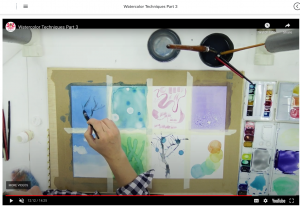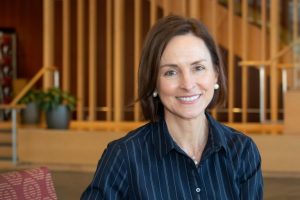This fall, a group of students in the College of Arts & Sciences are experiencing study abroad virtually with the Universidad San Francisco de Quito in Ecuador.

Karla Estrada Perez, a junior majoring in Hispanic linguistics and global studies with a minor in Portuguese, had planned to study abroad this summer. Then, she thought, maybe it would happen in the fall.
When neither worked out due to travel restrictions because of the COVID-19 pandemic she found she still had an opportunity to experience global learning from the safety of her apartment in Chapel Hill.
This fall, a group of students in the College of Arts & Sciences are experiencing study abroad virtually with the Universidad San Francisco de Quito in Ecuador, which began a partnership with Carolina in 2006. More than a dozen students are enrolled in the online classes with USFQ and three of them are participating in virtual research projects with the school.
They’re taking classes in Ecuadorian Quichua, a language not offered at Carolina; learning about climate change, ecology and conservation; and developing artistic skills in drawing and watercolor, which Perez chose to take this semester. Her instructor provided a materials list and a collection of in-depvth videos starting with basic watercolor techniques, like flat wash and straw blowing. Perez has found the art class to be exactly what she needed – flexible and unexpectedly therapeutic.

“Painting for a few hours has definitely been relaxing. And, it’s such a different experience. The class comes from all over the United States, and across the world, and from different ages and class years,” she said. “It’s also an opportunity to connect with staff and students at USFQ before hopefully studying there in person in the future.”
Heather Ward, Carolina’s associate dean for study abroad and international exchanges, said that while the pandemic has so many activities feeling painfully limited, the affordability and prevalence of online technology combined with the strength of Carolina’s longtime partnerships with global universities can actually bring the outside world closer than ever before.
“We saw quickly that we needed to be creative and look for other ways to deliver a global education to our students,” said Ward. “A lot of the benefit you get from traditional study abroad is to learn from international faculty, scholars and students who you might not encounter on campus at Carolina. Through our strong global partnerships, we can still deliver that benefit through remote courses with faculty and students at those institutions.”
Ward said that through the virtual study abroad option, a global education can be accessible for anyone. And, the University’s goal of providing a transformative global education to all undergraduate students – with more than half participating in study abroad – could be more possible than ever. Students who cannot study abroad due to family, job or campus commitments could find an entire semester of study abroad curriculum an option, if they can do it virtually. It also may allow students from global partner institutions into Carolina classrooms at a time when in-person exchange programs are suspended.
Students engaged in virtual study abroad this semester are supported by scholarships from the Office of the Vice Provost of Global Affairs to encourage participation in virtual cross-enrollment activities with UNC-Chapel Hill exchange partners, and their classes will count as experiential education credits.
“The world shut down, but technology can give us all a portal into a different place. In the future, this could mean we can all virtually visit places we’d never be able to travel to, so the geography for our students could actually expand, in a way,” said Ward.

In addition to the USFQ program, 10 students are taking Vietnamese language courses through SOAS University of London this fall, a partnership formed by the Carolina Asia Center. Students enrolled in Carolina’s joint-degree program with National University of Singapore are taking classes virtually and can count this as one of their required semesters spent at NUS.
“Part of the magic of study abroad has always been matching the right academic opportunity with students’ interests,” Ward said. “Now, we may be closer to doing this in larger ways for the students who wouldn’t be able to study abroad, or for those who have a specific curricular need. Even for the students who will study abroad, this could enhance that experience with exposure to a country’s language, people, and higher education system before they travel, and a way to maintain that connection once they return.”
Although the future of global travel remains uncertain, the Study Abroad Office is moving ahead with plans for spring 2021. The application deadline was Sept. 10, though some programs will accept applications until Oct. 1. Ward said Carolina will continue to follow UNC System guidance and travel restrictions as they advise interested students. The office is also working now to offer entire semester study abroad programs virtually in the spring.
By Courtney Mitchel, University Communications
